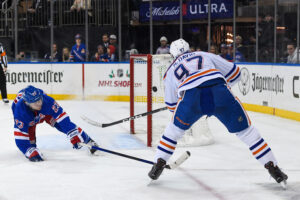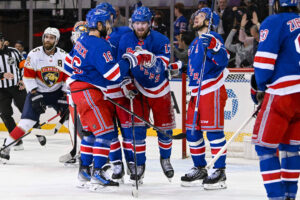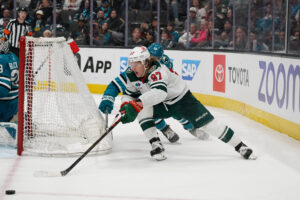The Toronto Maple Leafs have lost the first two games in their first-round Stanley Cup Playoffs matchup against the Boston Bruins. The Bruins have taken advantage of a weak Toronto defence; the Maple Leafs forward group has not generated enough offence; and Boston is just a better team. But it’s not just the players that are to blame for the Maple Leafs surprisingly weak start. Mike Babcock’s mistakes have played a considerable role as well.
Mike Babcock’s Mistakes Are Costing The Toronto Maple Leafs
The Leafs cannot be written off yet. Not without playing at least one game at home, but the fashion in which they lost the first two games does not inspire confidence. The Leafs played much better in Game Two, and if Nikita Zaitsev‘s seven-year contract can be forgotten, the Leafs look poised to become a Stanley Cup contender in the near future. Taking that next step has to start with the coaching staff, and it has to start in Game Three of this series. If Babcock cannot coach at an elite level, his players will not play at an elite level either. Making this series competitive starts with Babcock.
No Challenge On Boston’s First Goal Of The Series
“I wasn’t [challenging] because we didn’t have that replay. So then when the puck was being dropped, we had the replay. That’s disappointing. That’s also on the coaching staff, not on the players. That’s on us.” Mike Babcock on not challenging Brad Marchand‘s series-opening goal.
At this point in the series, coaches expect games to be close. Every goal matters and missing a challenge on a goal that was offside is a potential game-changing blunder. The Leafs finished that period tied 1-1 and were mentally out of the game by the third period. Winning that challenge and potentially taking a 1-0 lead to the dressing room at first intermission might have changed the course of Game One.
It’s easy to give Babcock a pass on this one. The Bruins played well the whole game and the Leafs played well for very little of it. Winning this challenge may have done nothing more than making the game a little closer than it was. The NHL’s threat of penalty if a coach is wrong on an offside challenge is a factor here too. That’s a risk that cannot be taken lightly, especially in the playoffs.
Leo Komarov On The First Line
It’s not Babcock’s fault Nazem Kadri lost control of his emotions and made a horrible and stupid, or horribly stupid, mistake when he ran a prone Tommy Wingels‘ head into the boards in Game One. But the lineup fallout from the three-game suspension Kadri got for that hit is all on Babcock.
Since he chose not to move William Nylander to center, there was no direct reason with Kadri out to break up the top line of Zach Hyman, Auston Matthews, and Nylander, but he did anyway. He took the Leafs’ only goal scorer from Game One and replaced him with the stone hands of Komarov.
Moving Komarov to the top line smacks of desperation. It’s not to get Matthews and Nylander going. Hyman has been playing that role well all season. If he does think he needs to get that line playing better, why not put Andreas Johnsson on it, or Kasperi Kapanen? The Bruins have been quicker than the Leafs everywhere in this series. Skating is supposed to be a strength for the Leafs. The Leafs need to find ways to get quicker. Putting Komarov on Matthews’ wing does not make their top line quicker.
Babcock is obsessed with matchups. Komarov was put on the top line to get more time against Marchand. Pest against pest. But the Leafs need to play to their own strengths, not worry about what the other team is doing. Especially when the other team’s pest is much better at the job that your player is.
Moving Patrick Marleau To Centre
The Leafs have been better with Nylander at centre than Patrick Marleau. They also have speedy replacements for Nylander on the top line in Johnsson and Kapanen. Babcock’s lack of trust in Nylander, or over trust in veterans, hurt the Leafs in Game Two. Nylander has not looked great in the two games so far, that is true, but his statistics in the regular season at centre were superior to Marleau’s. With Marleau at centre, the Leafs were outscored 15-9 this season. With Nylander at centre, they were 8-8.
Moving Nylander to centre is a sink or swim move for the young Swede. Not moving him to centre does nothing to help his confidence, which appears to be waning by the game. Moving him might have given him the confidence boost he needs to be productive again.
Pulling Frederik Andersen In Game Two
Frederik Andersen may not have been as sharp as he would have liked, but putting the blame on him for the Leafs quick deterioration in the first period of Game Two is not right.
David Pastrnak was left alone in front of Andersen with the puck for the first goal. Zaitsev was watching Jake Debrusk instead of playing him, or tying up his stick, on the second goal. And the third goal was a lucky bounce off Zaitsev. None of those goals are on Andersen. Yes, he could have made some highlight real saves, the Leafs are going to need that at some point, but pulling him for not making those saves isn’t going to better the Leafs chances of winning the game.
Curtis McElhinney has been a great back-up, but pulling the better goaltender in the first period is not often a good move in a playoff game. Andersen wasn’t playing poorly, his defence was. The Bruins put four more past McElhinney, who ended the game with a .826 save percentage in the game. Babcock was surely trying to send his team a message, to light a fire under them, but it didn’t work. He could also have put Andersen back in to start the second period. Message sent, get the better goalie back in, and talk about how to make the game close again. He didn’t do that either.
It’s Not Over
Babcock could make all the right moves and the Leafs could still be down 2-0 in this series. But the confidence to win, that the team can come back, starts with the coaching staff. When the coaching staff is floundering as much as the players, it’s hard to expect to players to rise up and overcome adversity. The good news is the series returns to Toronto on Monday, where Babcock will have more influence on the games than in Boston. The best thing about sports is no matter how much, or how bad, a team loses, there’s always another game around the corner to try again.






